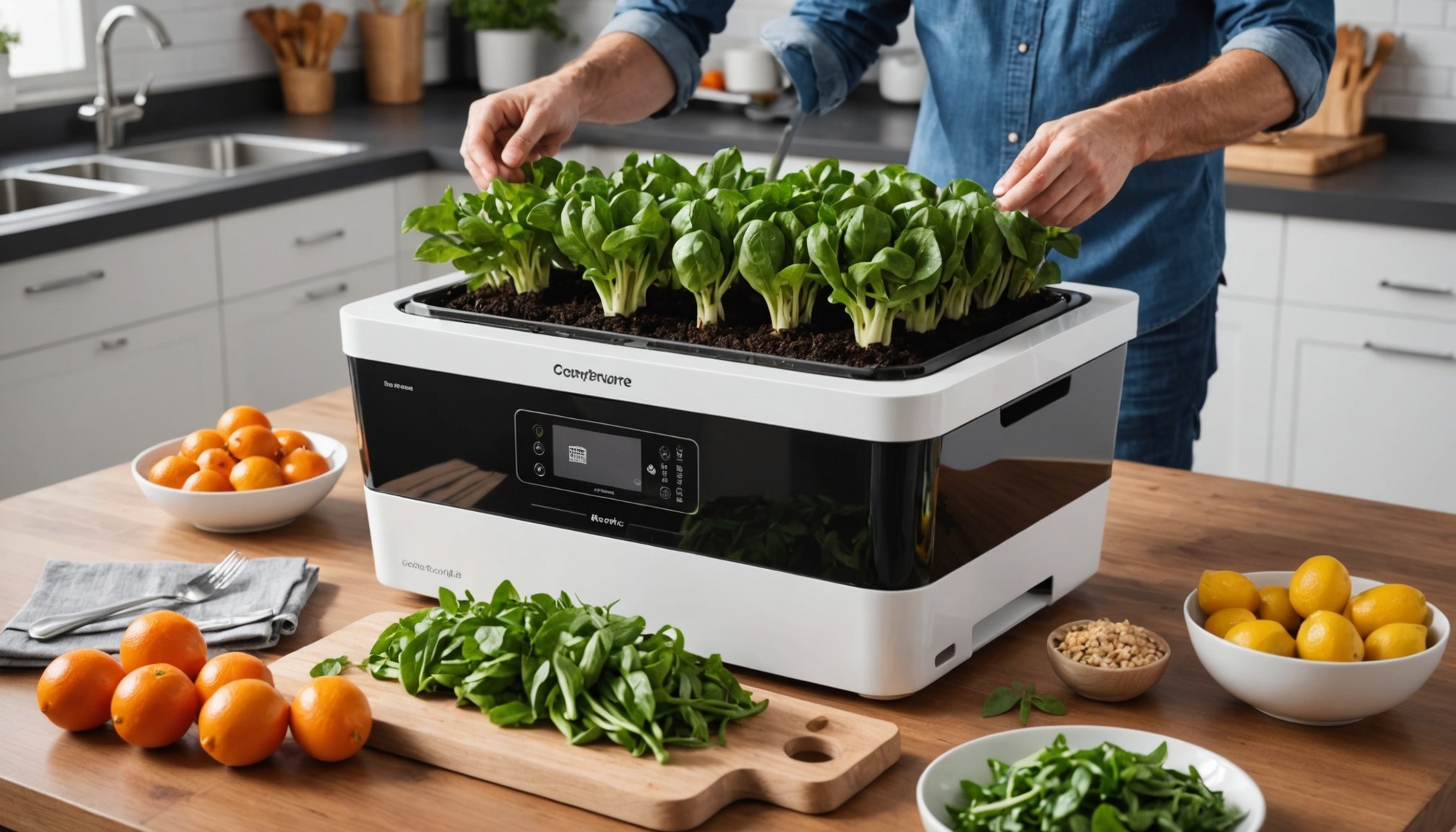Innovative kitchen composting technologies are redefining how we manage food waste, making it easier and more efficient than ever. As environmental concerns grow, these advancements allow homeowners to contribute to sustainability efforts, even in small kitchens. From smart composters to high-tech worm bins, the solutions available today cater to diverse lifestyles and needs. Explore how these cutting-edge options empower you to reduce waste, enhance your gardening efforts, and embrace a greener lifestyle, all from the comfort of your kitchen.
Overview of Kitchen Composting Innovations
Exploring advancements in composting for sustainable kitchens.
Additional reading : Essential Factors to Evaluate When Installing a Water Softener in Your UK Kitchen
Brief History of Kitchen Composting
Kitchen composting has evolved significantly from simple backyard piles to advanced composting technology. Initially, composting was a manual and time-consuming process, often limited to those with ample outdoor space. The need for more efficient and accessible methods led to innovations that cater to urban living.
Importance of Innovation in Composting
Innovations in kitchen composting technology are crucial for promoting sustainable practices. They address common challenges like space constraints and odor management. By integrating technology, these solutions make composting more accessible and convenient for households, encouraging wider adoption.
Also to discover : Creative Solutions for Discreetly Concealing Your Kitchen Appliances
Overview of Recent Trends
Recent trends in composting advancements include the development of compact and efficient composting units designed for indoor use. These systems often feature automated processes, making them user-friendly and reducing the effort required for maintenance.
- Key Trends:
- Smart composting bins with sensors
- Odor-neutralizing technology
- Energy-efficient designs
Such advancements not only enhance the practicality of composting but also align with broader environmental goals. By adopting these sustainable practices, individuals can significantly reduce their waste footprint, contributing to a healthier planet.
Smart Composting Devices
Unveiling the new era of composting technology.
Features of Smart Composters
Smart composters represent a leap in kitchen technology, designed to seamlessly integrate into modern homes. These devices are equipped with advanced features such as automatic mixing, temperature control, and moisture sensors. Such features ensure optimal conditions for composting, reducing manual intervention. Users appreciate the composting appliances for their ability to transform kitchen waste into nutrient-rich compost efficiently. They often come with user-friendly interfaces, making them accessible even to beginners.
Comparison of Popular Devices
When evaluating smart composting devices, consider factors like capacity, energy efficiency, and noise levels. Popular models such as the Lomi and Vitamix FoodCycler are frequently highlighted in reviews for their compact design and effective odor control. The Lomi, for instance, is praised for its rapid composting cycle and sleek appearance, while the Vitamix is noted for its robust build and ease of use.
| Device | Capacity | Energy Efficiency | Noise Level |
|---|---|---|---|
| Lomi | 4.5 L | High | Low |
| Vitamix | 5 L | Moderate | Moderate |
User Experiences
User reviews of composting appliances often highlight the convenience and effectiveness of these devices. Many users report a significant reduction in kitchen waste and appreciate the contribution to sustainable living. These smart composters are celebrated for making composting a viable option for urban dwellers.
Composting Methods Enhancements
Exploring modern approaches to composting for improved efficiency.
Innovations in Traditional Composting Methods
Recent advancements have transformed traditional composting methods into more efficient and user-friendly processes. Aerobic composting, which relies on oxygen to decompose organic matter, has been enhanced with better ventilation systems and mixing techniques. This ensures faster breakdown and minimizes odor. On the other hand, anaerobic composting, which occurs in oxygen-free environments, has seen improvements in containment and gas capture, making it more suitable for indoor use.
Advantages of Modern Aerobic and Anaerobic Techniques
Modern aerobic composting techniques offer quick decomposition and higher-quality compost, while anaerobic composting produces biogas that can be used for energy. These methods are particularly beneficial for urban settings, where space and odor control are crucial. The choice between these techniques often depends on available space and desired outcomes.
-
Aerobic Composting:
-
Requires oxygen
-
Faster decomposition
-
Produces high-quality compost
-
Anaerobic Composting:
-
Oxygen-free
-
Slower process
-
Generates biogas
Tips for Optimizing Composting Methods in the Kitchen
To optimize composting methods in the kitchen, ensure proper waste segregation and maintain balanced moisture levels. Regular monitoring of temperature and pH can also enhance the efficiency of both aerobic and anaerobic processes.
Sustainability Practices in Kitchen Composting
Emphasizing eco-friendly strategies for a zero-waste kitchen.
Importance of Sustainability in Kitchen Composting
Implementing sustainable composting practices is vital for reducing household waste and promoting environmental responsibility. By adopting eco-friendly practices, individuals can minimize their ecological footprint and contribute to a zero-waste lifestyle. These efforts not only support waste reduction but also enhance soil health by returning nutrients to the ecosystem.
Practices to Enhance Eco-Friendliness
To boost the eco-friendliness of kitchen composting, consider the following practices:
- Segregate waste: Separate compostable materials from non-compostables to ensure efficient decomposition.
- Utilize composting bins: Choose bins made from recycled materials to further support sustainable composting.
- Monitor moisture levels: Maintain optimal moisture to prevent odors and enhance breakdown.
Incorporating these methods can significantly improve the efficiency and environmental impact of your composting efforts.
Benefits of Promoting a Zero-Waste Kitchen
A zero-waste kitchen not only reduces landfill contributions but also fosters a healthier living environment. By embracing sustainable composting, households can decrease their reliance on chemical fertilizers, leading to both economic and ecological benefits. Ultimately, these eco-friendly practices pave the way for a more sustainable and mindful lifestyle.
Efficiency Improvements in Composting
Enhancing the speed and effectiveness of composting processes.
Technological Advancements
The integration of technology into composting has significantly improved composting efficiency. Modern devices now incorporate features like enhanced aeration and temperature control, accelerating the composting speed. For instance, some systems use automated mixing to ensure even decomposition, reducing the time needed to produce nutrient-rich compost.
Device Efficiency Comparison
Different composting devices offer varying levels of efficiency. For example, smart composters with sensors can adjust conditions automatically, optimizing the process. In contrast, traditional methods may require more manual intervention and time. Here's a comparison of efficiency across popular devices:
| Device | Composting Speed | Efficiency Level |
|---|---|---|
| Smart Composter | Fast | High |
| Traditional Bin | Slow | Moderate |
Impact on Waste Reduction
Efficient composting processes play a crucial role in waste reduction. By speeding up decomposition, these devices help households convert more kitchen waste into usable compost, reducing landfill contributions. This not only benefits the environment but also enhances the sustainability of domestic practices. As a result, adopting efficient composting methods becomes a practical solution for achieving a zero-waste lifestyle.
Environmental Impact of Kitchen Composting Innovations
Examining the role of composting in environmental sustainability.
Reduction of Landfill Waste
Kitchen composting innovations significantly reduce the volume of waste directed to landfills. By transforming organic waste into compost, households can cut down on trash disposal, thus minimizing landfill accumulation. This process not only conserves landfill space but also decreases methane emissions, a potent greenhouse gas.
Contributions to Sustainability
Innovative composting technologies enhance sustainability by promoting a circular economy. These technologies convert kitchen waste into valuable resources, such as nutrient-rich compost, which can improve soil health and reduce dependence on chemical fertilizers. This aligns with sustainable agricultural practices, fostering a sustainable environment.
- Key Contributions:
- Decreased landfill waste
- Reduced greenhouse gas emissions
- Enhanced soil fertility
Expert Opinions
Experts emphasize the long-term environmental benefits of adopting advanced composting technologies. According to sustainability consultant Dr. Jane Smith, "By integrating these innovations, we can significantly lower our carbon footprint and support ecological balance." Such endorsements underscore the critical role of composting in achieving environmental goals.
In summary, the environmental impact of kitchen composting is profound, offering a practical solution for waste reduction and sustainability. As these technologies continue to evolve, their potential to contribute to a healthier planet becomes increasingly evident.
User Experiences and Case Studies
Discover the real-world impact of composting innovations.
Compilation of User Experiences
User reviews reveal that many individuals find new composting technologies transformative. Users appreciate the efficiency and ease of use of smart composters, often noting a significant reduction in kitchen waste. Many have shared stories of how these devices seamlessly integrate into their daily routines, making composting a practical habit.
Case Studies of Successful Kitchen Composting
Several case studies highlight the success of kitchen composting in diverse settings. For instance, a family in New York City adopted a smart composter and reported a 60% reduction in their weekly waste output. Another case in San Francisco showed how a small restaurant utilized composting to enhance its sustainability practices, converting food scraps into valuable compost for local gardens.
- Key Successes:
- 60% waste reduction in NYC family
- Local garden support in San Francisco
Lessons Learned from Users’ Composting Journeys
Through their composting journeys, users have learned valuable lessons. Many emphasize the importance of regular maintenance and the benefits of choosing the right device for their needs. These experiences underscore the potential for composting technologies to foster sustainable habits and contribute to environmental goals.
Tips for Implementing Kitchen Composting Innovations
Integrating composting into your daily routine can be seamless with these strategies.
Practical Tips for Integration
To successfully incorporate kitchen composting innovations, start by assessing your composting needs. Consider the volume of waste you produce and the space available. Choose a smart composting device that aligns with these factors for optimal integration. Position the device in a convenient location, such as near the kitchen sink, to encourage regular use.
Step-by-Step Guide to Setup
Setting up a smart composter is straightforward with this step-by-step approach:
- Unbox and Assemble: Follow the manufacturer's instructions.
- Select Location: Ensure it's accessible and has an electrical outlet if needed.
- Initial Setup: Calibrate sensors and set preferences for moisture and temperature.
- Start Composting: Add organic waste and let the device manage the rest.
Overcoming Common Challenges
Challenges in composting implementation often include managing odors and understanding device functions. To combat odors, ensure proper waste segregation and maintain balanced moisture levels. Familiarize yourself with the device's user guide to troubleshoot any operational issues.
- Key Challenges:
- Odor management
- Device calibration
- Space constraints
By following these implementation strategies, you can effectively integrate composting into your lifestyle, enhancing both convenience and sustainability.
Future Trends in Kitchen Composting Technology
A glimpse into the innovations shaping the future of composting.
Predictions for Future Advancements
The future of composting is set to be transformative, with technology trends driving significant innovations. Experts predict that composting innovations will increasingly incorporate artificial intelligence to optimize decomposition processes. These advancements aim to further automate waste management, making it even more efficient and user-friendly.
Emerging Trends to Watch
Several emerging trends in kitchen sustainability are gaining traction. Key developments include the integration of IoT (Internet of Things) for real-time monitoring and the use of biodegradable sensors to track compost quality. These technology trends promise to revolutionize how households manage organic waste.
- Key Trends:
- AI-driven composting systems
- IoT-enabled monitoring
- Biodegradable sensors
Potential Impact of Ongoing Research
Ongoing research and development in composting innovations hold the potential to drastically reduce household waste. By focusing on technology trends, researchers aim to create systems that not only enhance efficiency but also contribute to environmental sustainability. According to Dr. Emily Green, a leading researcher, "The future of composting lies in harnessing technology to create sustainable solutions for waste management."
In summary, the future of composting is bright, with innovative technologies poised to redefine kitchen sustainability.
Resources and Further Reading
Explore composting resources to deepen your understanding.
Reputable Sources for Kitchen Composting
For those seeking to expand their knowledge on kitchen composting, several educational materials offer valuable insights. The Environmental Protection Agency (EPA) provides comprehensive guidelines on home composting practices. Additionally, the Composting Council Research and Education Foundation offers a wealth of expert insights into composting technologies, emphasizing sustainability and efficiency.
Recommended Books and Articles
Delve into composting technologies with recommended readings that explore innovations and practical applications. "The Rodale Book of Composting" is a classic resource, offering detailed techniques and tips. Another essential read is "Let It Rot!" by Stu Campbell, which provides a thorough overview of various composting methods and expert insights into their benefits.
Expert Interviews and Insights
Gain further understanding through expert interviews that highlight the future of composting innovations. Dr. Emily Green, a leading researcher, notes, "The integration of AI and IoT in composting systems is set to revolutionize waste management." Such expert insights underscore the importance of staying informed on emerging trends and composting resources.
By exploring these educational materials, individuals can make informed decisions and contribute effectively to sustainable practices.













